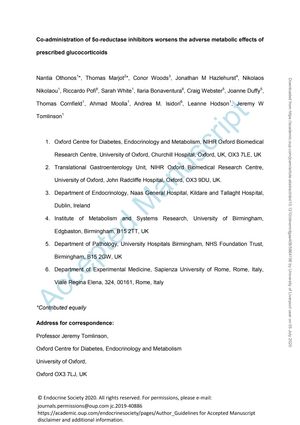Co-Administration of 5α-Reductase Inhibitors Worsens the Adverse Metabolic Effects of Prescribed Glucocorticoids
June 2020
in “
The Journal of Clinical Endocrinology and Metabolism
”

TLDR Taking 5α-reductase inhibitors with prednisolone can worsen its negative effects on metabolism.
In a study with 19 healthy male volunteers, it was discovered that the combination of 5α-reductase inhibitors (5αRIs) with prednisolone significantly exacerbated the glucocorticoid's negative metabolic effects. Prednisolone alone did not significantly affect glucose metabolism, but when combined with a 5αRI, there was an increase in glucose production and a decrease in glucose utilization and oxidation. Additionally, the co-administration impaired insulin's ability to suppress circulating non-esterified fatty acids. The participants were divided into groups receiving prednisolone only (n=6), prednisolone plus finasteride (n=7), and prednisolone plus dutasteride (n=6), with the two 5αRI groups later combined for analysis. The study suggests that the combination of these drugs, often prescribed for conditions like benign prostatic hyperplasia or polycystic ovary syndrome, could have significant clinical implications and indicates the need for careful monitoring and possible dose adjustments when these drugs are used together. The study was powered to detect a 15% change in endogenous glucose production and included extra participants to allow for potential drop-outs or sample analysis issues. However, the findings are specific to prednisolone and may not apply to other synthetic glucocorticoids or all administration routes.







